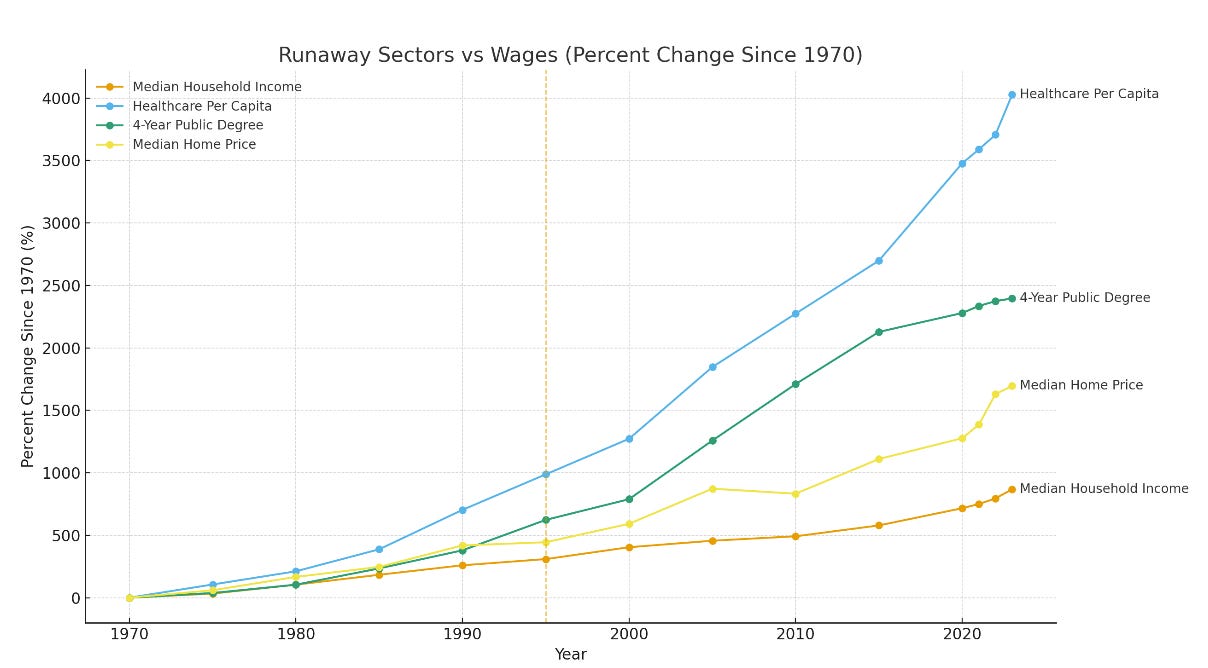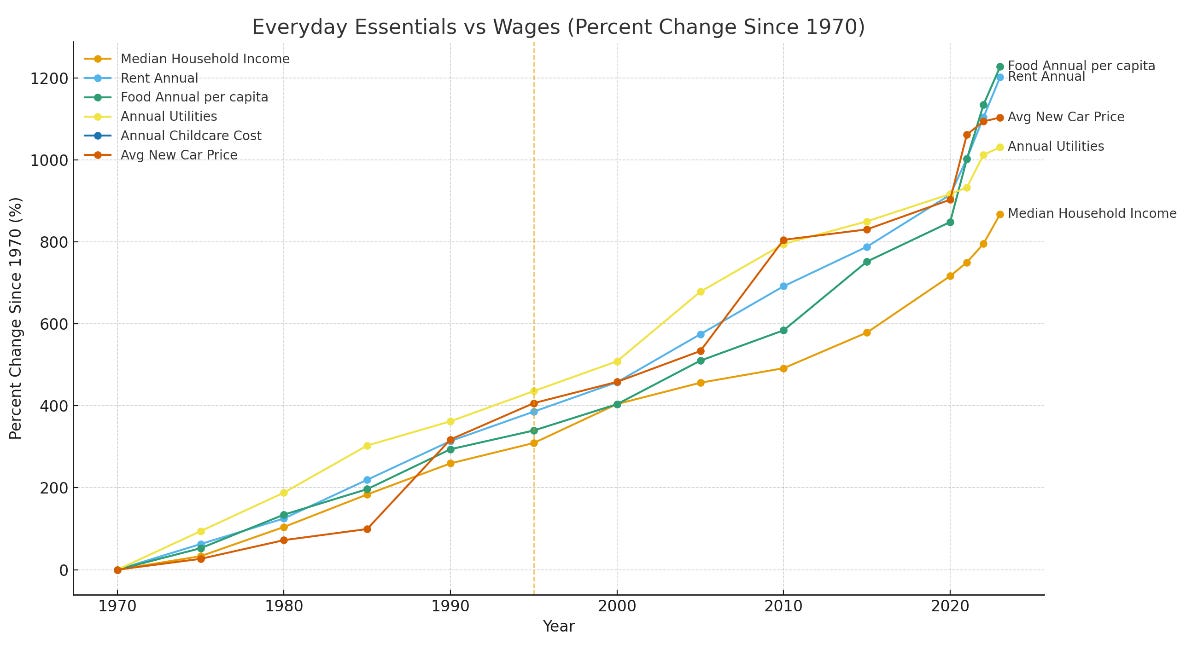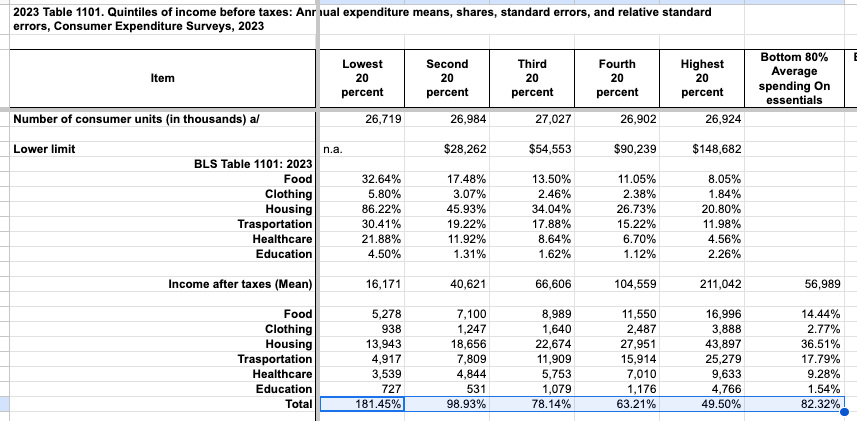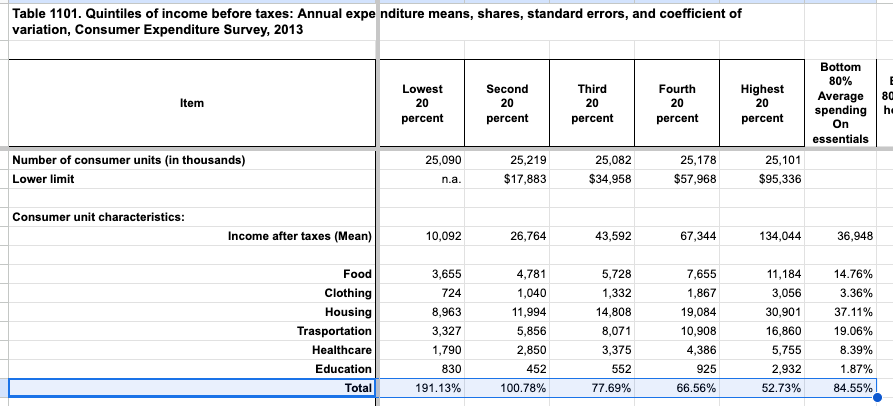The Country We Have Vs the Country We Imagine
If we can't agree on the scale of a crisis, we can't agree on the scale of a solution.
Nine days ago, I laid out a draft of a pledge akin to Newt’s Contract for America. first agree on what is broken. If you can’t agree on the scale of a crisis, you can never agree on the scale of a solution.
This is my attempt to lay out the first and most important reality, one that so many of us know in our bones but that the establishment continues to deny.
The people in charge—the politicians in Washington, the economists at Hahvahd, the CEOs in boardrooms—all describe a nation that does not exist for most of us. Strongest economy EVER! Record GDP! Look at the MARKET FOLKS! “Real Wages” are up across the board.
Our greatest economic minds reckon we oughta be in awe of the riches that their management has bestowed upon us.
Every official metric tells us we're richer than our parents, grandparents, all that have come before us would look at even the poorest amongst us green with envy. The story goes that even Kings and Queens could only dream to trade their life for that of a trailer park dweller or a section 8 resident. We're living the dream.
Alas, it’s a lie. A goddamn lie. It's the big lie.
Why does it matter that we share this understanding of reality? Why can’t you think things are ok but need improving? Because this lie paralyzes us. If the prevailing wisdom is to be believed then there is no problem. No need for fundamental shifts in the foundation of our system.
Also, explicit in this lie is that failure is our own fault if we struggle financially or socially. It means that if we’re poor we’re fuck ups that didn’t heed Dave Ramsey’s advice. After all the fantasy of America and the data tell us the same story. America is the land of opportunity. You fail, you suck.
Politicians, voters and non-voters alike all look at the stats to determine a plan of action. Is the good life out there waiting for us?
Unless we share this reality we have no chance in mobilizing the strength to overturn a system that constantly fails us. To overcome the corporations, the billionaires and the yes men in our government that have their boots on our throats economically it’ll take a lot of political will. A lot of political fights. Brave people, terrified people, but united people.
The odds of a child earning more than their parents have fallen from 90% for those born in 1940 to 50% for those born in the 1980s.
People that agree in this simple truth: We are not failing. The system is failing us.
We're Not Crazy. The System Is.
Let's start with what we know in our bones.
Our parents and grandparents could afford a home on one income. Now we struggle on two. Our grandparents raised a family on a factory wage. Today even with a college degree many can't afford daycare. That degree once cost a summer job. Now it's a lifetime of debt.
They want to tell you about personal responsibility, bootstraps, or about the choices you've made. The elite, academics, and CEOs want us to believe that if we’d worked a little harder, gotten a different degree, made a different decision, we’d have risen above it all.
But when an entire generation is locked out of the stability their parents took for granted, the problem isn't the generation—it's the system.
According to a 2017 study we’ve long lost social mobility. We're not better off than our parents. Our kids probably won't be better off than us.
We need to understand that the people telling you otherwise are invested in not seeing the truth. They are tracking the portfolios of the rich instead of the lives of the working. They are celebrating the health of the parasite while the host, you and me, get sicker every year.
The Scale of the Heist
You don't need an economics degree to see the crime scene. You just need basic arithmetic.
Housing: In 1950, the median household income was about $3,073 and the median home cost around $7,500. 2.8 times a household’s yearly pay. In 2023, the median household income was $80,610 and the median home cost $430,000 or 5.3 times a household income. No inflation though. Just ask experts.
Keep in mind that more and more homes had two people working full-time. So what once took 2.8 years of income for one worker now requires 5.3 years from TWO. The one-income household is DOA.
Education: In 1973, you could pay for a year of public university tuition (about $400) by working roughly 250 hours at the federal minimum wage ($1.60). Today, with average public university tuition at $11,610, you'd need to work over 1,600 hours at the current minimum wage—most of a full-time job just for tuition. Forget food, rent, or books.
The game has been fundamentally changed. The cost of entry into the middle class now requires a lifetime of debt and labor that was unimaginable two generations ago.
Where’s The Money, Lebowski?
So where did all the prosperity go? It didn't vanish. It was taken. Housing, healthcare, education, transportation, and food make up the bulk of our spending. And corporations have gobbled it up.
A landmark study from the RAND Corporation calculated the scale of the heist. If income had been distributed as equitably as it was from 1945-1975, the bottom 90% of Americans would have earned $79 trillion more over the past 50 years.
That's not a typo. Trillion. With a T.
In 2023 alone, the transfer was $3.9 trillion. That's enough to have given every single worker in America an additional $32,000.
Stop and think about that number. Every American worker in a single year, 2023, was robbed of 32 grand. What would an extra $32,000 have meant for your family last year? A down payment? An end to credit card debt? The ability to see a doctor without checking your bank account first?
That money is our money. It was earned by our labor, our infrastructure, our markets. Then stolen with interest, inflation, and policy choices.
CEO pay exploded from 30-to-1 in 1978 to 290-to-1 today. The top 1% now owns 31% of all wealth—up from 23% in 1989.
Why are people so pissed? Why is xenophobia, homophobia, Islamophobia, racism, on the rise in the West? This is one of the reasons. We’ve spent the last 50 years being mugged with policy. Blaming immigrants or leftists or right wingers and Trump and everyone in between is simpler than acknowledging the truth. They are easier fixes too. Walls, bombs, bullets, and deportations. Much easier than rebuilding an entire economy and society.
The Gaslighting Machine
How do they hide a crime this massive in plain sight? They build a gaslighting machine “experts say” or “the News” or "economic data."
They use sophisticated, elegant-sounding mathematical formulas to tell us it's raining while they piss all over us.
The official inflation number is their primary weapon, engineered to hide the affordability crisis. Here's exactly how they do it:
"Substitution": When steak gets too expensive, the statisticians quietly assume you now buy hamburger. When hamburger gets too expensive, they assume you switch to chicken. When chicken gets too expensive, it's beans. They are not measuring the cost of living; they are measuring the cost of surviving. By constantly moving the goalposts downward, they report that prices are stable while you are eating worse for more money.
"Hedonic Adjustments": When a new car includes a backup camera that used to be an option, they count that as a price decrease because you're "getting more car for your money." But you can't buy the old, cheaper car anymore. You are forced to pay the full sticker price, while the government reports that your cost of living went down.
"Averaging the Absurd": TVs got 94% cheaper while healthcare costs have tripled since 2000—from $4,900 per person to $14,570. They call it a wash. But you need healthcare to live. A TV is optional. It's like saying "Sure, chemotherapy will bankrupt you, but have you seen the deal on flatscreens?"
The lies, the blatant lies that we're told about our economy, our living situations, are just enraging and offensive.
More Than Money
The $79 trillion heist was never just about cash. They didn't just steal our money; they stole our capacity. They stole our ability to do things, to build, to create, and to care for our own.
We can't build infrastructure projects anymore. We can't complete a high-speed rail system. The road on I-40 between Asheville and my home is still down to two lanes because part of it collapsed into a river, and God knows how many years that'll take to fix.
They've got us in a situation where 54 percent of this country can't read beyond a sixth-grade level, and 20 percent of us are functionally illiterate. At the same time, they tell us we have a 99 percent literacy rate because people can read a sentence.
We are the only developed nation where mothers are three times more likely to die in childbirth than 25 years ago. Our life expectancy is falling.
We are literally sick from the stress, the debt, and the garbage food that's all many can afford. Over 130 million Americans have multiple chronic conditions.
The Hidden Costs
The average family now spends $13,174 annually on transportation—more than double what most people think. Childcare costs average $11,582 per year, often exceeding college tuition. We're spending more on basic necessities than we earn.
The Bureau of Labor Statistics' own data shows that families in the bottom 80% spend more than they earn just on necessities—before accounting for anything else. This isn't overconsumption; it's mathematical impossibility sustained only through debt.
They haven't just taken the fruit; they've poisoned the tree. They've left us a nation rich on paper but poor in the real capacity to provide decent lives for our people.
Stop Debating on Their Turf
The evidence is overwhelming. The American economic system is no longer failing by accident; it is succeeding at its new design: concentrating wealth and power for the few while dismantling the foundations of a dignified life for the many.
This is the rot beneath the floorboards of our democracy. This is the economic carnage that fuels the political chaos. January 6th, Minnesota, Kirk, Pelosi...
Trump’s election victories were outlandish. They were the predictable consequences of telling a drowning country that it's not even wet. When you gaslight people about their own lives for long enough, they will eventually burn the whole thing down. Blame anyone they can find—an immigrant from Guatemala, some trans kid, whomever—because the people who actually robbed us live in walled-off communities or a yacht in the Mediterranean. We're not running into them at the grocery store.
We have a choice. We can keep pretending. We can keep tweaking the machine that's grinding us into dust. Or we can admit the truth. The experiment failed. The system is broken. It's time to build something new. An economy where we build things again. An economy where one job is enough to raise a family. An economy where the goal is the prosperity of our people, not the fiction of our spreadsheets.
We did this before, from 1933 to 1975. We can do it again. But first, we gotta stop lying about where we are and how we got here.
Our eyes aren’t lying to us. The spreadsheets are.
Help spread a shared reality. Share this. Post it on social media. Restack it. Forward it. And comment on the thoughts below.
• Did any of these numbers or comparisons surprise you? Which ones stood out most?
• If you were explaining this to a friend, which example would you start with?
• What’s the best way to show people that the system is failing us—not that we’re failing as individuals?
• If you could put just one chart, story, or fact on a billboard in your town, what would it be?
For the economists reading this: The data supporting these claims comes from Carter C. Price's extension of the RAND wage divergence study (WR-A516-2, 2025), Federal Reserve Distributional Financial Accounts (WFRBST01134), Census Historical Income Tables (P-60 series), NCES Digest of Education Statistics, BLS Consumer Expenditure Surveys via FRED (CXUTRANSLB0101M), CDC National Vital Statistics Reports, Commonwealth Fund maternal mortality analyses, NAEP Reading Assessment data, and Chetty et al.'s work on intergenerational mobility (Science, 2017). The productivity-compensation gap documented by EPI, the PCE deflator biases analyzed by the Boskin Commission, and the hedonic adjustment critiques from Stiglitz-Sen-Fitoussi all support the core thesis: our measurement systems systematically obscure declining affordability and eroding living standards for the bottom 90% of Americans.






You have accurately described the America that my kids and I live in. I am retired and have worked to have a comfortable retirement. My income is abut $70,000 per year and I live in a 650 square foot part of a home that I share with my son and his family. Sharing a home makes it possible for us to share expenses. I feel fortunate as my children and grandchildren are unable to buy a home in this housing climate. The average cost of a home in my area is $484,000. The mortgage on that is just impossible for my family members. I feel like my generation was the last generation to live in a country where the average person can own a home and save for their retirement. The feeling of security that I had is now gone for the majority.
It is not just other Americans the wealthy and corporations are stealing from, it is planet wide. I recently ran some numbers on the pay package suggested for Elon Musk, 29 billion, comparing it to the Kenya average median income. If Elon's package was equally distributed, 15 million Kenyans could double their annual income. That is just one billionaire, albeit a ridiculous, self-centered lout. Distribution is one part of the problem, the other (arguably more important) is the strain on the planet generated by this inequity. Affluenza is a disease affecting the planet, https://substack.com/home/post/p-171795161
Thanks for this posting. The data is rich, even as it exposes the impoverishment generated by the problem.